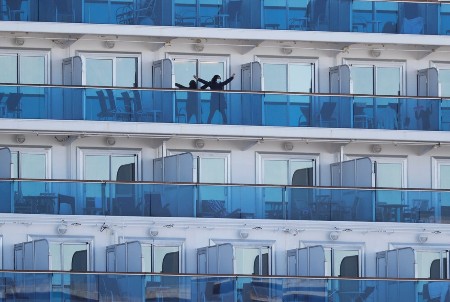June 7, 2020 – COVID-19 may do what the norovirus never did to cruising. The bane of cruise ships in recent years, norovirus, left hundreds of thousands of passengers with acute gastrointestinal illness from contaminated food, water and surfaces. This was never a large percentage of the total number of those on board, but the stories made headlines around the world back in the day.
Then came COVID-19, a virus that made norovirus look like a minor blip on the industry’s radar. Ships couldn’t find a port. Crews were stranded, and thousands were infected. The Princess Cruises’ Diamond Princess ended up in quarantine in Osaka harbour with 3,800 onboard. A month-long lockdown forbade passengers and crew from leaving while more became infected with COVID-19. In the end, what started with a single COVID-19 passenger testing positive turned into 700 infected over the month including crew and passengers, and 14 deaths.
Diamond Princess was the first of many barred from ports and unable to disembark passengers and crew while incidents of COVID-19 flared up throughout cruise ships around the globe. This virus, unlike norovirus, highlighted just how susceptible the closed-in environments of cruise ships were to the spread of disease.
The global increase in travel, and the romantic notion of going by sea, has created record numbers of cruisers. This apparent success has become the industry’s Achilles Heel. Cruise ships have a genuine problem of infection control which leads to widespread potential transmission on ships carrying thousands on one and two-week jaunts with fast turnarounds in ports to take on new passenger loads. Ships, like airplanes, are high infection zones to the public because deep cleaning is nearly impossible between sailings and flights.
How can the industry recover? How do you manage physical distancing, a prerequisite to limiting disease transmission, on a ship with thousands of passengers and hundreds of crew aboard? Health and hygiene have to take priority over any activities onboard. From accommodation for crew and passengers to food services and amenities, cruise ships will need to be rethought in their entirety. Otherwise, they will cease to exist.
Currently, governments around the world have advised citizens not to go on cruises. Companies like Carnival, Norwegian Cruise Line, Princess Cruises, and Royal Caribbean have seen their revenues collapse. In an article published on CNBC’s website, they call the COVID-19 pandemic “the cruise lines’ 9/11.” The companies have been getting some assistance from government bailout packages, and have secured loans from banks and lenders for what can only be seen as depreciating assets.
In an article that appeared in the May 8, 2020 edition of the Los Angeles Times, David Lazarus, a business columnist writes:
“If we’ve learned nothing else … it’s that cruise ships are a breeding ground for nasty, potentially lethal little germs — and that the vessels are perfectly positioned to transport those germs around the world…Moreover, this industry has made plain it cares little for customers’ loyalty, in many cases denying refunds for canceled trips and instead, offering credit for upcoming cruises. Which is to say, a chance to be sickened at a future date.”
There appears to be a similar problem for airlines who have been just as reluctant to provide passengers with refunds for canceled flights, trying to palm off credits for future trips. This lack of regard for passengers and their financial welfare is akin to the lack of regard for passenger health and safety. In a New York Times article on the cruise crisis, written by Tariro Mzezewa, she quotes Ross Klein, a sociologist from Memorial University in Newfoundland whose field of study is the cruise industry. Klein states, “For the cruise lines and the industry a lot of … decisions are based on economics. They are asking themselves, ‘How do we get by spending the least amount of money and losing the least amount of money?'”
Yesterday, the Financial Times described COVID-19 as “a crippling blow” to the 338 ships that currently offer cruises to passengers around the world. It noted that the industry is hemorrhaging $1 billion a month just to maintain its mothballed fleets. And with operations not expected to start up again until August at the earliest, cruising may die. With 60,000 crew still stranded on ships that cannot find a landing port to dock and go home, it is a wonder that there are no more aboard outbreaks of the virus.
The cruise operators are facing numerous court cases from passengers and relatives of those who lost loved ones, and from the families of crew who became ill. Investors are suing the companies. And disease control national organizations are investigating claims that the cruise lines lied about onboard disease outbreaks to ensure continued bookings. Governments have accused them of disembarking infected passengers without identifying their health status.
Is the reaction overblown? The industry claims that the total number of deaths from COVID-19 aboard cruise ships so far has amounted to 82. And with all this the industry is still building even bigger ships. The latest monster is the 228,000 ton Royal Caribbean Symphony of the Seas with capacity for over six thousand passengers and a crew of 2,200. That’s a lot of opportunity for an aggressive virus to make havoc.
Although the industry points to the 82 number as being the net damage in terms of human lives, the perception of incompetence in terms of health and safety is becoming a reality. An environmental group that follows the industry describes the business culture of cruise operators as “morally bankrupt.” They point out the levels of environmental negligence practiced by cruise operators that regularly dump and pollute the air and oceans, and that continue to operate under flags of convenience to avoid being regulated by the countries from which they operate and sail. Yet one of those countries, the United States, under its current president has thrown them a bone and got the Saudis to chip in because the owner of Carnival is a big political backer and donor.















